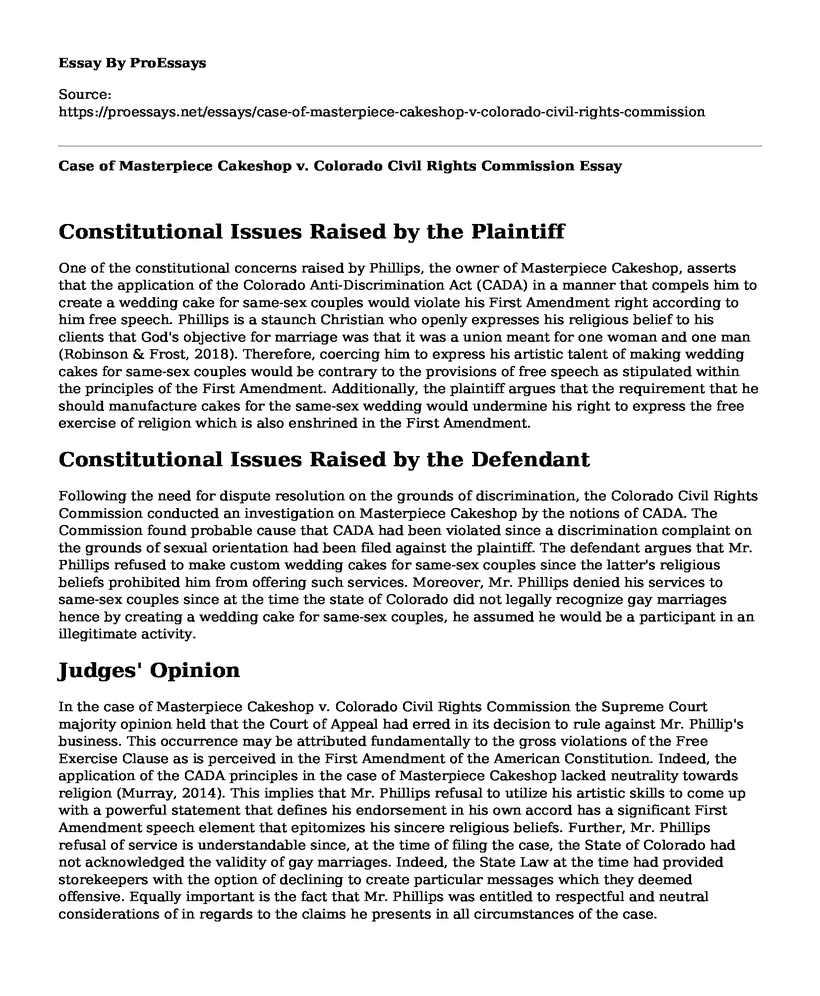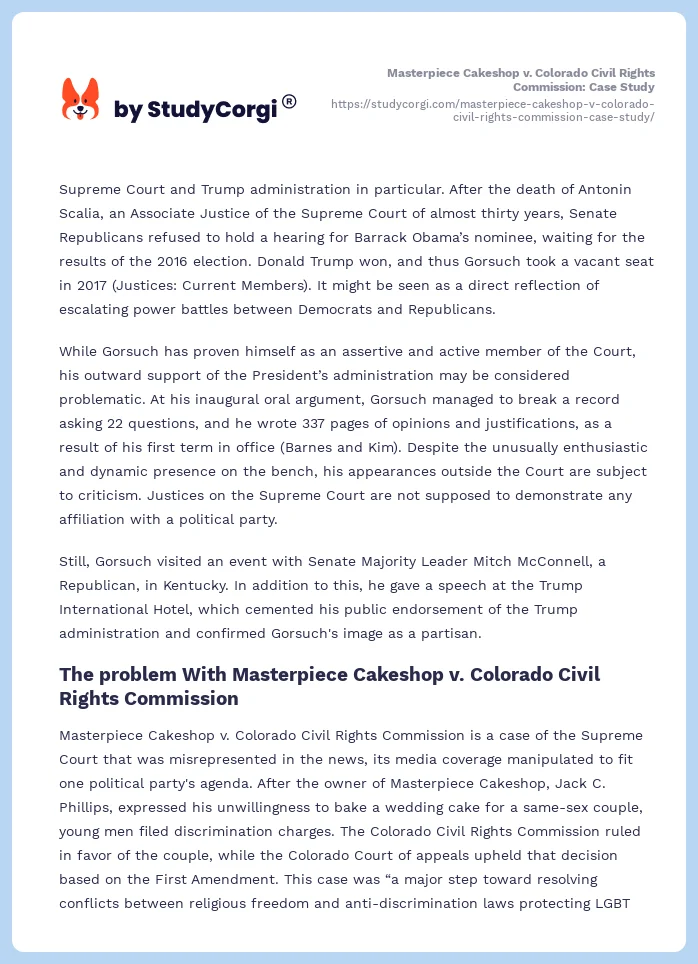Imagine walking into a bakery, ready to celebrate a special occasion. You’re excited to order a cake that will make your event unforgettable. But then, the baker tells you they can’t create the cake you want because of your sexual orientation. Would this be legal? This is the heart of the controversial case, Masterpiece Cakeshop v. Colorado Civil Rights Commission, a case that shook the nation and raised profound questions about religious freedom, discrimination, and the balance between individual rights and societal values.

Image: proessays.net
This legal battle wasn’t just about a cake. It was about the clash between two fundamental principles: the right to free exercise of religion and the right to be free from discrimination. At its core, the Masterpiece Cakeshop case forced us to confront the complexities of how we navigate these rights in a diverse and increasingly interconnected world.
A Cake Shop’s Refusal: A Spark Ignites a Legal Storm
In 2012, Charlie Craig and David Mullins, a same-sex couple, approached Masterpiece Cakeshop in Colorado to order a cake for their wedding celebration. The owner, Jack Phillips, citing his religious beliefs, declined to create the cake, arguing that it would violate his religious conviction against same-sex marriage. This refusal sparked a legal battle that would echo through the halls of the Supreme Court, exposing the deep societal divisions surrounding religious freedom and LGBTQ+ rights.
The Colorado Civil Rights Commission: Upholding Equality, Facing Criticism
Following Phillips’ refusal, Craig and Mullins filed a complaint with the Colorado Civil Rights Commission. The commission, responsible for ensuring equal treatment for all individuals regardless of their sexual orientation, ruled in favor of Craig and Mullins, finding that Masterpiece Cakeshop had violated Colorado’s Anti-Discrimination Act. The Commission’s decision, aimed at upholding non-discrimination principles, sparked intense controversy, particularly among those who felt their religious liberties were being infringed upon.
Masterpiece Cakeshop Fights Back: A Religious Freedom Claim Takes Center Stage
Phillips appealed the Commission’s decision to the Colorado Court of Appeals, arguing that he was exercising his First Amendment right to free exercise of religion. He maintained that creating a cake for a same-sex wedding would violate his deeply held religious beliefs. Phillips’ appeal, supported by numerous religious and conservative organizations, highlighted the conflict between religious freedom and the right to non-discrimination, bringing the case to the attention of the nation.

Image: studycorgi.com
A High Court Showdown: The Supreme Court Weighs In
The case eventually reached the Supreme Court in 2018. This marked a pivotal moment in the legal landscape, raising crucial questions about the extent of religious exemptions and their impact on LGBTQ+ rights. The Court, in a 7-2 decision, sided with Masterpiece Cakeshop, ultimately ruling in favor of Phillips and his right to free exercise of religion. However, the Court did not rule on the broader issue of whether businesses could legally discriminate based on sexual orientation. Instead, the Court focused on the Colorado Civil Rights Commission’s conduct during the proceedings, finding evidence of hostility towards Phillips’ religious beliefs.
Masterpiece Cakeshop: A Landmark Decision with Lasting Impact
The Supreme Court’s decision was a significant development in the ongoing debate surrounding religious freedom and LGBTQ+ rights. While the Court did not establish a broad right for businesses to refuse service based on sexual orientation, the case provided a victory for those advocating for religious exemptions. The decision highlighted the need for careful balance between protecting religious expression and ensuring equal treatment for all individuals.
A Complex Balancing Act: Examining the Implications of Masterpiece Cakeshop
The Masterpiece Cakeshop case exemplified the intricate relationship between religious freedom and non-discrimination. While the Court’s ruling provided a win for religious freedom advocates, it also raised concerns about potential discriminatory applications of the decision. The case ultimately left a number of questions unanswered, prompting continued debate and legal challenges in the years that followed.
The Fight for Equality Continues: Post-Masterpiece Cakeshop
The aftermath of the Masterpiece Cakeshop case saw a continued struggle to balance religious freedom with protections against discrimination. Numerous legal challenges, both in Colorado and across the nation, emerged from individuals seeking exemptions from anti-discrimination laws based on religious beliefs.
Masterpiece Cakeshop V. Colorado Civil Rights Commission.
The Legacy of Masterpiece Cakeshop: A Complex and Evolving Landscape
The Masterpiece Cakeshop case stands as a landmark moment in American jurisprudence, exposing the complex and often conflicting values at play in contemporary society. The case highlighted the importance of both religious freedom and non-discrimination, while also raising concerning questions about the potentially discriminatory application of religious exemptions.



/GettyImages-173599369-58ad68f83df78c345b829dfc.jpg?w=740&resize=740,414&ssl=1)


